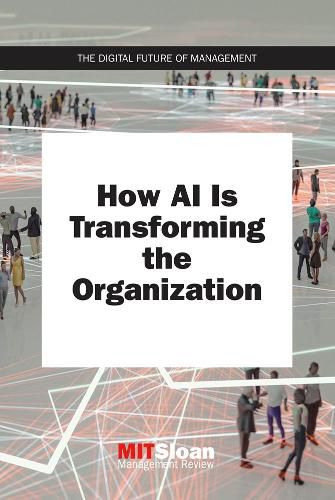Readings Newsletter
Become a Readings Member to make your shopping experience even easier.
Sign in or sign up for free!
You’re not far away from qualifying for FREE standard shipping within Australia
You’ve qualified for FREE standard shipping within Australia
The cart is loading…






A clear-eyed look at how AI can complement (rather than eliminate) human jobs, with real-world examples from companies that range from Netflix to Walmart.Descriptions of AI’s possible effects on businesses and their employees cycle between utopian hype and alarmist doomsaying. This book from MIT Sloan Management Review avoids both these extremes, providing instead a clear-eyed look at how AI can complement (rather than eliminate) human jobs, with real-world examples from companies that range from Netflix to Walmart. The contributors show that organizations can create business value with AI by cooperating with it rather than relinquishing control to it. The smartest companies know that they don’t need AI that mimics humans because they already have access to resources with human capability-actual humans. The book acknowledges the prominent role of such leading technology companies as Facebook, Apple, Amazon, Netflix, and Google in applying AI to their businesses, but it goes beyond the FAANG cohort to look at AI applications in many nontechnology companies, including DHL and Fidelity. The chapters address such topics as retraining workers (who may be more ready for change than their companies are); the importance of motivated and knowledgeable leaders; the danger that AI will entrench less-than-ideal legacy processes; ways that AI could promote gender equality and diversity; AI and the global loneliness epidemic; and the benefits of robot-human collaboration.
Contributors Cynthia M. Beath, Megan Beck, Joe Biron, Erik Brynjolfsson, Jacques Bughin, Rumman Chowdhury, Paul R. Daugherty, Thomas H. Davenport, Chris DeBrusk, Berkeley J. Dietvorst, Janet Foutty, James R. Freeland, R. Edward Freeman, Julian Friedland, Lynda Gratton, Francis Hintermann, Vivek Katyal, David Kiron, Frieda Klotz, Jonathan Lang, Barry Libert, Paul Michelman, Daniel Rock, Sam Ransbotham, Jeanne W. Ross, Eva Sage-Gavin, Chad Syverson, Monideepa Tarafdar, Gregory Unruh, Madhu Vazirani, H. James Wilson
$9.00 standard shipping within Australia
FREE standard shipping within Australia for orders over $100.00
Express & International shipping calculated at checkout
A clear-eyed look at how AI can complement (rather than eliminate) human jobs, with real-world examples from companies that range from Netflix to Walmart.Descriptions of AI’s possible effects on businesses and their employees cycle between utopian hype and alarmist doomsaying. This book from MIT Sloan Management Review avoids both these extremes, providing instead a clear-eyed look at how AI can complement (rather than eliminate) human jobs, with real-world examples from companies that range from Netflix to Walmart. The contributors show that organizations can create business value with AI by cooperating with it rather than relinquishing control to it. The smartest companies know that they don’t need AI that mimics humans because they already have access to resources with human capability-actual humans. The book acknowledges the prominent role of such leading technology companies as Facebook, Apple, Amazon, Netflix, and Google in applying AI to their businesses, but it goes beyond the FAANG cohort to look at AI applications in many nontechnology companies, including DHL and Fidelity. The chapters address such topics as retraining workers (who may be more ready for change than their companies are); the importance of motivated and knowledgeable leaders; the danger that AI will entrench less-than-ideal legacy processes; ways that AI could promote gender equality and diversity; AI and the global loneliness epidemic; and the benefits of robot-human collaboration.
Contributors Cynthia M. Beath, Megan Beck, Joe Biron, Erik Brynjolfsson, Jacques Bughin, Rumman Chowdhury, Paul R. Daugherty, Thomas H. Davenport, Chris DeBrusk, Berkeley J. Dietvorst, Janet Foutty, James R. Freeland, R. Edward Freeman, Julian Friedland, Lynda Gratton, Francis Hintermann, Vivek Katyal, David Kiron, Frieda Klotz, Jonathan Lang, Barry Libert, Paul Michelman, Daniel Rock, Sam Ransbotham, Jeanne W. Ross, Eva Sage-Gavin, Chad Syverson, Monideepa Tarafdar, Gregory Unruh, Madhu Vazirani, H. James Wilson